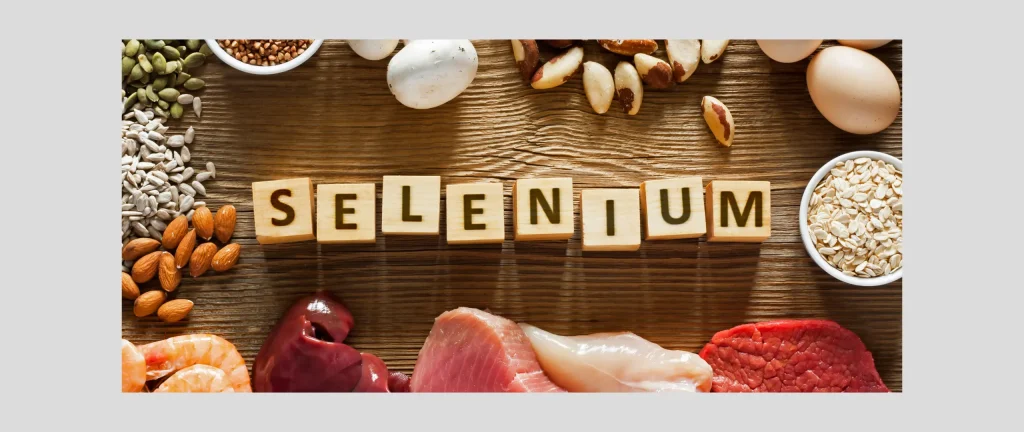What is a micronutrient? A chemical element or substance required in trace amounts for the normal growth and development of living organisms.
If you search for anything health related online these days, you’re bombarded with tons of information about what nutrients are ‘must haves’. There’s always a new recommendation, and unfortunately, they’re not always based on solid science. Today’s post is meant to cut through the noise and talk about a micronutrient that’s always been on my radar: selenium. It’s a key ingredient in one of the first products we ever developed. And with good reason: although we need small amounts of this powerful mineral, it plays a big role in so many body functions. I’m going to share with you what I’ve learned over the years as an integrative practitioner and passionate biochemist.

The Role of Selenium
Selenium is a trace mineral that the body needs in small quantities but wields a substantial impact on our well-being. It acts as a potent antioxidant, working in tandem with other vitamins such as beta carotene (Vitamin A) to combat harmful molecules known as free radicals. These free radicals can damage our cells, our DNA, and can contribute to aging and various health conditions. Antioxidants like selenium help neutralize these free radicals and help minimize cellular damage.
Our first line of defense is to minimize our exposure to free radicals by reducing our everyday exposure to chemicals, pesticides, pollution, etc.
Our advice? Limit exposure by choosing a diet of minimally processed foods and be careful HOW you consume fats (avoid fried foods), as well as avoid putting oils on your skin. Topical application of oil oxidizes on the skin.
But let’s get back to selenium. There are so many areas of the body that this micronutrient can support:
Immune System Support. Selenium plays a pivotal role in supporting a healthy immune system. It aids in the production of white blood cells, strengthening the body’s ability to fight off infections and illnesses.
Thyroid. This essential mineral also contributes to proper thyroid function, which regulates metabolism, energy production, and overall well-being.
Prostate Health. Research suggests that selenium may have a protective effect on the prostate, reducing the risk of prostate cancer. Some studies have indicated that selenium supplements may lower this risk, particularly in individuals with low baseline selenium levels.
Cardiovascular Health. Selenium, when combined with other antioxidants like vitamin E and beta-carotene, may help lower LDL (bad) cholesterol levels, contributing to better cardiovascular health.
How do I get enough Selenium?
Getting enough selenium is crucial for maintaining good health. In theory, you should be able to get all the nutrients you require from eating the right foods. Selenium is an essential mineral, meaning you must get it from a supplement or from your diet.
But the unfortunate reality is that modern agriculture methods are depleting the mineral content in the soils where we grow our foods. This is creating inconsistency of the mineral content in the things we eat.
To know you’re getting the level of nutrients you want, our recommendation is supplementation – about 200 mcg of selenium daily. Our patented formula, Cell Support, supplies the right amount of selenium as well as amino acids and vitamin A to work in synergy to create an antioxidant powerhouse.
In addition, you can consider introducing the following foods into your diet as a source of selenium. These are all great foods to eat for their overall nutritional profile.

- Brewer’s yeast and wheat germ.
- Liver (think cow and chicken). Just be sure to choose grass fed and pasture raised animals.
- Fish and shellfish: Mackerel, tuna, halibut, flounder, herring, and smelts are all selenium-rich fish options, and for shellfish, choose oysters, scallops, and lobster.
- Garlic: Incorporating garlic into your meals can provide a selenium boost.
- Whole Grains. Foods like brown rice and whole wheat bread contain selenium.
- Sunflower Seeds: Snacking on sunflower seeds is a tasty way to increase your selenium intake.
- A popular source of selenium is Brazil Nuts, but we’ve found that the levels of selenium fluctuate by nut so widely that we DON’T recommend using brazil nuts as a source of this micronutrient.
Selenium is an often-overlooked micronutrient that plays a pivotal role in various bodily functions. From supporting the immune system to contributing to thyroid health and potentially reducing the risk of certain cancers, selenium is an essential element for overall well-being. Although there are many benefits to eating a healthy diet, with today’s food supply, you can’t rely on food alone to supply all your nutrient needs.
Your every day habits are more important than ever to maintain and improve your health. Adding selenium to your routine can support your overall health in so many ways. Reach out to us at Meehan Formulations if you want to learn more by using our Minute Clinic Button.